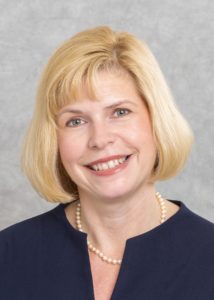

Gail Hoffman, Managing Director of Golden Seeds and member of Groupize’s Board of Directors
January 18, 2018Golden Seeds is focused on investing in the vibrant opportunities of women-led companies. As such, we work with many talented, passionate female entrepreneurs who are doing truly remarkable things. Our “How Did She Do It?” series shares the stories, challenges and successes of the women behind the companies of Golden Seeds.

Today, Gail Hoffman, board member of Groupize, interviews Alisa de Gaspe Beaubien (left), Chief Operating Officer and Co-Founder of Groupize.
Below, they discuss how de Gaspe Beaubien launched her company, which is revolutionizing managed travel.
The company has created innovative, cloud-based solutions that reduce the complexity of sourcing, booking, tracking and managing multi-room bookings, extended stays, groups and meetings in real time.
AdGB: My husband, Charles, and I had both worked in travel. In 2009, he was working for a startup in rail transportation that was going through a transition, so we decided it was time to leverage our experience to start our own company. Founded in the attic of our house, Groupize initially focused on group transportation management. Following some initial success, we expanded the scope of our business to focus on all segments of leisure group travel. When a large hotel chain approached us to solve its groups and meetings challenges, we could not refuse. We won that account, our first major client, and the company grew from there. Today, we have a rapidly growing roster of marquee customers, key partnerships and technological integrations, and an experienced management team.
AdGB: We’re in the arena of managed corporate travel. Our software-as-a-service (SaaS) platform helps users manage simple meetings and events, with an emphasis on face-to-face gatherings and events. Unlike the large events companies might sponsor once a year, these simple meetings happen many times a year and often represent a larger expense and increased risk for the company.
Most meeting planners today are not dedicated specialists; they are executive admins who have many other responsibilities. Historically, the available technology was too complicated and expensive, built for professional planners who organize large, complex and infrequent meetings. But, uncomplicated tools for frequent, basic meetings — such as Excel, fax machines, and the phone — weren’t effective or efficient. Charles and I saw a need for an easy-to-use technology for simple events, and we created a model that disrupted the status quo. Unlike many of our competitors who provide solutions for large events, we don’t ask our customers to pay per user license or attendee. Instead, we offer annual plans based on the estimated number of events, making it much easier for companies not only to budget and control their meetings, but also to roll-out our solution enterprise-wide.
We partner with corporate travel agencies to reach businesses that host at least five meetings annually that require travel. Our prospects have been very receptive. In 2018, we’ll power simple meeting planning and execution for hundreds of companies, including several of the Fortune 100.
AdGB: We had to make some market fit adjustments at the beginning. We like to say we had a vitamin, but everyone wanted medicine. We were a nice-to-have for our initial target market — hotel chains. Because the target customers did not have a compelling reason to change their behavior or processes, the sales cycle proved too lengthy for a startup.
Listening and talking to our advisors, our prospects and our customers about their most pressing business issues made the difference. Our technology was nice-to-have for the hotel industry, but critically important in managed corporate travel — we made a year-long pivot in response.
AdGB: My husband and co-founder, Charles, was recently recognized by Business Travel News as one of the 25 most influential leaders in our industry. It’s an unbelievable list that includes hotel executives, the founder of Uber and the heads of other travel-related firms. For a startup CEO to be included on that list in the leading publication of our industry, in recognition of a travel category we created, is a wonderful honor and validation.
In the second half of 2017, Groupize partnered with one of the largest sellers of meetings. They have thousands of customers and will leverage our technology to get significant new business from their existing customers. So, this relationship will be significant for us this year, during which our goal is to be North America’s leader in simple meeting technology.
AdGB: Charles and I are very fortunate in that we had already worked together at two other corporations before launching Groupize. We recognize and respect each other’s strengths and weaknesses, so we know how to divide and conquer for the benefit of our company.
Separating our work lives from our home lives is challenging, but we have two kids who don’t want to hear about work when we all get home at the end of the day. As a wife-husband team, we try to be careful about that.
AdGB: We learned about Golden Seeds after Charles presented at a Boston-area pitch event. Someone from Golden Seeds was in the audience and asked us to attend their Office Hours for entrepreneurs. That’s where we met you, Gail. You invited us to present to Golden Seeds investors and then Golden Seeds became our first institutional investor. Beyond our initial angels and our own investment, Golden Seeds was the first to recognize and believe in us, our vision, and the opportunity we all saw.
The Golden Seeds network means we have a lot of fans out there. They provide credibility to our organization, and they include us in discussions and introductions. For example, we got a great lead recently because its CEO is related to a Golden Seeds partner. Beyond those kinds of leads, we know we can pick up the phone and talk to an expert within Golden Seeds who can advise us on a wide range of issues, which is important to first-time entrepreneurs. And because Golden Seeds is known for its extensive due diligence, we’ve been able to leverage that in subsequent rounds with co-investors. It makes the process much smoother for micro-VCs.
To any early-stage founder, I’d recommend not focusing on valuation first when it comes time to seek funding. Instead, focus on finding the partner who can get you to the next stage. The valuation isn’t as relevant day-to-day, but having access to a network of experts is essential to setting realistic expectations and meeting them.
For more wisdom like this from other amazing female leaders, follow Golden Seeds on Twitter.